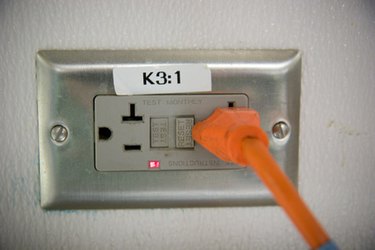
Ground-fault current interrupting outlets can save lives. They stop power whenever they detect a sudden change in current, such as might happen if someone were to touch an ungrounded appliance while standing in water. The National Electrical Code previously only required GFCI outlets on construction sites. But in order to protect anyone who plugs into an electric circuit, it expanded the requirements to include many areas inside and outside commercial and residential buildings.
Residential Buildings
Video of the Day
The 2002 NEC code requires GFCI protection for all 15- and 20-amp, 120-volt outlets in residential bathrooms and for many in kitchen areas. The 2005 version requires all outlets within 6 feet of a sink or wet area to have ground-fault protection, not just outlets on countertops, as the earlier version had specified.
Video of the Day
The current code requires all outlets in garages, basements and crawl spaces to have ground-fault protection. This requirement does not apply if they are not readily accessible, or on dedicated circuit lines intended for an appliance, like a garage door opener or a sump pump. If your basement is finished and habitable, the wall outlets do not have to be GFCIs.
Commercial Buildings
The requirements for outlets inside a commercial building are more stringent than for a residential one. In a commercial kitchen, every 15- or 20-amp, 120-volt outlet must be a GFCI, not just the ones on the countertops or near a wet area. As in residential buildings, all bathroom outlets in a commercial building must be GFCIs, as well as those on rooftops or in basements. If the commercial building has a workshop, every outlet in it must be have ground-fault protection, as it would if the workshop were in a residential building.
Outdoors
While the code does not require ground-fault protection on outlets outside a commercial building, it does require GFCIs for most outside a residential one. This includes all receptacles located on the side of the house, under the eaves and on outbuildings. The only exception to this rule is an outlet that powers a fixed appliance, such as a snowblower or de-icer, that is connected to a dedicated circuit. If you have a hot tub or jacuzzi, the outlet into which you plug it must have ground-fault protection, and all outlets around pools must be GFCIs.
Temporary Circuits
The NEC requires GFCI protection on all 15-, 20- and 30-amp, 120-volt circuits whenever you are remodeling or doing construction outside or inside a residential or commercial building. If you draw power from an outlet that is not GFCI-protected, you must provide ground-fault protection somewhere in the circuit. Holt notes an exception in the code for establishments in which only qualified personnel are involved. The exception allows an alternate grounding method for equipment that would pose a hazard if power were interrupted.